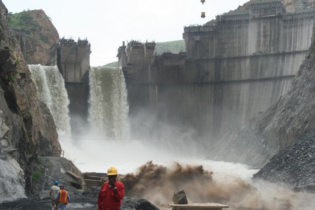BIGEN AFRICA has enhanced its vision, mission and value proposition to reflect its thought leadership in providing innovative, sustainable infrastructure development solutions in Africa and abroad over an entire project’s lifecycle. Water&Sanitation Africa speaks to Dr Snowy Khoza, CEO, BIGEN AFRICA, about the organisation’s new vision.
The organisation’snew vision emphasises the improvement of the quality of life of all through sustainable infrastructure development. Its mission is to become the thought-leading multi-national infrastructure development consultancy with three main capabilities spanning thirteen sectors, including water, sanitation, roads, energy, housing and rural development:• engineering (e.g. civil, structural, and electrical)
• management consulting (e.g. programme and asset management)
• development financing (e.g. project financing and transactional advisory). While strengthening the southern Africa business, with South Africa as the regional port of entry, the company will also expand its Africa footprint; initially into West Africa through Ghana (two offices are established in Nigeria) and then into East Africa through Kenya. By 2016, the intention is to expand its offices into Central and North Africa – the current approach is project, and not office-focused. BIGEN AFRICA has fourteen offices in South Africa, and is represented in eight countries on the rest of the continent, including Mauritius. The expansion vision of BIGEN AFRICA focuses on using its partnership strategy as the platform for doing business outside South Africa and Africa. The brand is increasingly recognised in Australia, Ireland, Britain, Dubai, Iran and China. Although BIGEN AFRICA’s base is in South Africa, it will continue to focus on doing projects in Africa and participate in infrastructure development projects outside the continent. According to Dr Khoza, “Our infrastructure development strategy is clearly focused on contributing to a country’s strategy by addressing its resource, political, economic, social, environmental and technological issues, which are most likely to significantly impact on the lives of people over the short and medium to long term. We recognise the need to participate in assisting countries to address their key emerging public policy priorities which, among others, include integrated human settlements, water and sanitation, rural development, renewable energy, mining, road and rail freight transport, health and education, development/project financing, operation and maintenance of existing infrastructure.”
Enhancing development impact: poverty reduction, capacity building and job creation
Dr Khoza adds, “infrastructure development is, first and foremost, about the sustainable benefits of the socially desirable developmental outcomes that emanate from the use of infrastructure. Our commitment to all the countries that we operate in (through our annual social compacts) is contributions with a development impact.” The development impact includes:• access to services such as water and sanitation, energy and roads for communities
• reduction of poverty through, inter alia, rural development by facilitating agricultural beneficiation of products
• capacity building, empowerment and skills transfer to local labour and small businesses for sustainable broad-based empowerment or indigenisation
• creation of sustainable, quality job opportunities for communities.
Corporate social responsibility In terms of the organisation’s corporate social responsibility (CSR),it involves doing good while doing business. Dr Khoza, a development activist at heart says, “While we believe in CSR approaches, the difference which sets us apart from other corporates is that we believe doing business is about doing good.” She emphasised that, “gone are the days when corporates take resources from communities and, as an after-thought, give ‘something’ back to them. As we plan projects, we also plan our contribution for community priority needs – to leave and maintain a legacy.”






